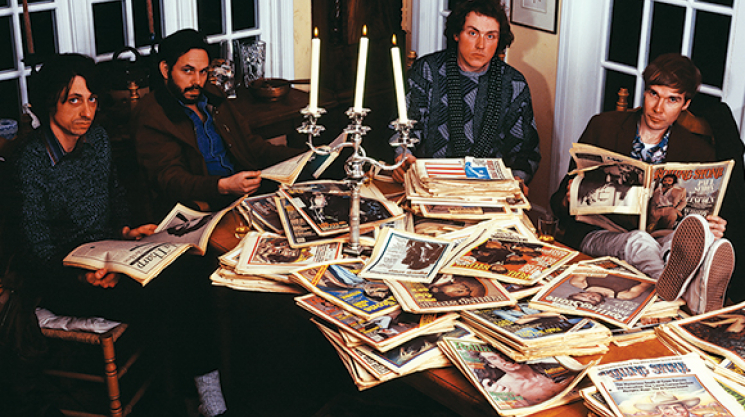
Tue, 07/01/2014 - 13:42 by Natasha Neale
You could say that The Shilohs sound a lot like the better power-pop acts of the sixties and seventies—your Kinks and your Big Stars. So much so, in fact, that you might say that’s exactly what The Shilohs frontman Johnny Payne was going for on their full-length debut, So Wild, released last year. And you wouldn’t be wrong. But, The Shilohs’ brand-new self-titled LP is much more diverse than their previous release. Those power-pop influences remain, of course—they seem engrained in their DNA—but The Shilohs sounds a little less like a set of knock-off songs, and a little more like…well, The Shilohs. That’s due both to members Mike Komaszczuk and Daniel Colussi bringing more material to the table, and also because they’ve grown in confidence as a band, and are less interested in emulating their influences. Patrick Rodgers speaks with the band’s power-pop frontman Johnny Payne on behalf of ION, about their new self-titled record, influences, and of course, their hometown of Vancouver.
Will you tell me a little bit about the process of making this record; how it was different from last time, and how was it similar?
The last time, I had a pretty clear vision of how I wanted it to sound. This time, I had a pretty good vision too, but the last time, we had less time in the studio. We just did it ourselves. We didn’t have a label; we didn’t really have much support besides that of our friends, who put in a good word for us at JC/DC, the studio where we did it. So we went in there, and we had to have a clear plan, which I did. And that’s why I feel like I produced the last one, to the point that we wanted to be a sixties-sounding record. I wanted to emulate sounds of bass, and guitars, and handclaps, and percussion, and harmonies, like the great groups that I loved, that I had spent my life studying.
And then this one was more like we had become a band - we were all writing songs, we knew what our band sounded like, and we were going to set out and make a Shilohs record. We all went in and had a bit more time for experimentation, and the other guys got more into the studio life of their songs. We had a little more freedom with this one. And at the same time, we were more confident, too.
I’m definitely hearing more of a diverse sound, and fewer moments that directly channel influences like The Kinks, or Harry Nilsson, or Big Star. Do you think that comes from the confidence in knowing your own sound, and having the freedom to explore it more?
Yeah, last year, when we did So Wild, I didn’t know anything about songwriting. I used to sit and listen to Harry Nilsson, and The Kinks, and Big Star, and love those records to death. So, obviously, when I picked up a guitar and tried to sing, a lot of those guys came out—Ray Davies, and Chilton, and whoever. There was a lot of mimicry happening there. I was trying to be myself; I wasn’t trying to really rip anybody off, but that was what I loved, so I wanted to sound like that. The same way The Beatles wanted to sound like The Ronettes, or The Rolling Stones wanted to sound like Muddy Waters, in the beginning. Then, as we went on, all of us found our voice. Mike used to sing with more of a twang and stuff, too. When I met him, he wore a bandana, and cowboy shirts, and boots. He had a real Waylon Jennings on the road vibe, and it was rad.
We were all young, impressionable guys. Dan would come over to my house, and we’d listen to Chris Bell and try to figure out how to morph one of the songs I’d already written into a Chris Bell-type groove. And then eventually, you start writing songs, and I was less interested in what they sounded like, and more interested in what the lyrics meant to me, and the fact they sounded like a song that I’d written.
I read a quote that said when you were starting out, there were a lot of stoner-rock bands in Vancouver at the time, and you wanted to have a different sound. The first song on your first record is called “This is Vancouver Music.” Is that a statement, or an incidental name for the song?
It was a statement, but not about that. Not that Vancouver music should sound like that. It was more a statement about this girl I knew, who told me that she thought we sounded like an American band, and that the other bands from Vancouver sounded more like Vancouver music to her. So it was kind of like, “Well we’re from Vancouver too, so f*ck you. This is Vancouver music,” you know what I mean?
It’s all Vancouver music—the stoner rock, the noise-punk bands, the minimal electronic, the DJs. These days, surely just because you play country music doesn’t mean you have to be from Nashville, right? People tend to pigeonhole sounds, certain genres, which is absurd considering how far we’ve come in pop music. No matter what kind of song I write, it’s gonna be Vancouver music if this is where I’m living. You know, because the mountains, and the cars, and the restaurants, and the birds on the telephone pole, they all influence me. If it’s in our city, then it comes out in the songs.




Add comment